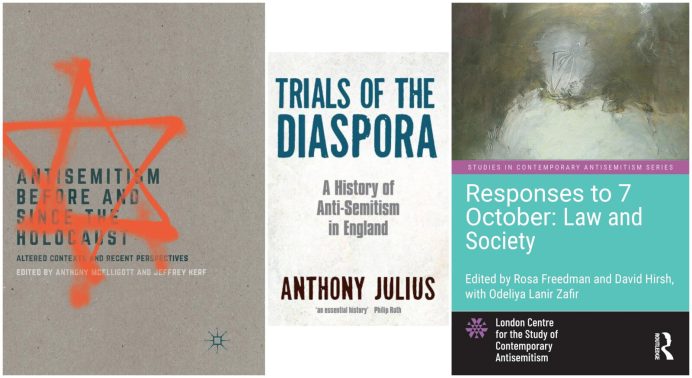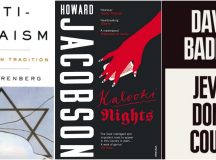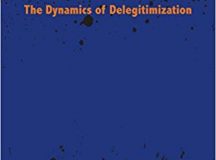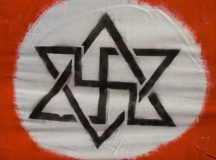Lesley Klaff is Editor in Chief of the Journal of Contemporary Antisemitism.
Holocaust inversion is, in the words of the late Manfred Gerstenfeld, ‘the portrayal of Israel, Israelis and Jews as modern-day Nazis, and Palestinians as the new Holocaust-era Jews.’ There is much very good, informative material about it, but it’s generally written alongside discussion of other forms of Holocaust distortion, such as denial, trivialisation, universalisation, and relativisation. As a consequence, there is no single book on Holocaust inversion alone, only chapters, sections in chapters, and essays.
The main contributors to this literature include Manfred Gerstenfeld, Robert Wistrich, and Deborah Lipstadt, with further contributions by Anthony Julius, Alan Johnson, Ben Gidley, Clemens Heni, Philip Spencer and several others (including myself). It’s a difficult task to pick just three chapters to write about. So, I’ve made my choice on the basis of what the chosen chapter contributes to my knowledge and understanding of Holocaust inversion over and above the common coverage of definition, provenance, manifestations, and impact.
In fact, I would currently recommend the reading of any chapter or essay whatever on the topic of Holocaust inversion, given its prevalence in political debates about the Israel-Palestine conflict, and the readiness of many of those who are hostile to Israel to deploy this particular form of Holocaust distortion, alongside the constantly repeated use of the charge of genocide. My personal choice is of three chapters which I’ve found particularly illuminating: one by Robert Wistrich, one by Anthony Julius, and one by Philip Spencer.
Robert Wistrich – Antisemitism and Holocaust Inversion in McElligott, A., and Herf, J. (Ed’s) Antisemitism Before and Since the Holocaust (Palgrave Macmillan 2017).
The late Professor Robert S. Wistrich, who died in 2015, was regarded as an outstanding historian and the world’s foremost authority on antisemitism. He wrote 30 books and 400 academic articles on it, many of which addressed Holocaust inversion, especially in the British context. The particular chapter (published posthumously) which I’ve chosen here was one in which Wistrich attempts to answer a question that has perplexed me for some time: ‘Why did the Holocaust, rather than stamping out antisemitism, precipitate further animosity towards Jews in the form of Holocaust distortion, such as denial and inversion, the latter of which is especially pernicious because it equates the Jewish state of Israel with Nazism?’ Anthony Julius also addresses this issue in his book Trials of the Diaspora: A History of Antisemitism in England (2010), in which he points out that ‘The Holocaust should have altogether put paid to anti-Semitism. It should have rebutted once and for all the principal anti-Semitic fantasy of malign Jewish power; it should have satiated the appetite of the most murderous anti-Semites for Jewish death. And yet instead it precipitated new anti-Semitic versions or tropes […]’.
It is a deeply puzzling question. In this chapter, Wistrich offers an answer to it by drawing on the work of the French philosopher, Vladimir Jankelevitch, who drew a connection between Israel, antisemitism and the Holocaust. Jankelevitch noted that the Holocaust had cast a shadow of remorse over the Europeans as they came to realise the magnitude of their crimes against the Jews. Wistrich argues persuasively that accusing Israel of behaving like Nazi Germany performs a psychological function for Europeans, because it acts as an ‘overcompensation mechanism’ for discharging their latent guilt feelings about the ‘unspeakable crime of the Shoah’. Wistrich writes: ‘And what if the Jews themselves were no better than the Nazis? Why, that would be just wonderful. One would no longer have to feel sorry for them – after all, ‘they would have deserved their fate’.
Moreover, explains Wistrich, accusing Israel of being no better than the Nazis (and maybe even worse because the Jews failed to learn a lesson from their persecution) allows those with animus towards Jews to express it in the ‘politically correct’ language of anti-Zionism. Thus, writes Wistrich, ‘those who accuse Israel of being a Nazi state kill two birds with one stone’.
So, one of the strengths of this chapter is that it provides a convincing psychological explanation for the widespread and perplexing use of Holocaust inversion found in many aspects of European – and British – intellectual life. It also helped me to understand why otherwise intelligent and educated people are happy to Nazify Israel. It apparently assuages their guilt feelings about the Holocaust and allows them to indulge their hostility towards Jews in the politically correct way, using the language of anti-Zionism. Wistrich concludes that anti-Semitism has returned dressed in the effective disguise of anti-Nazism.
Anthony Julius – Contemporary Secular Anti-Zionisms, in Trials of the Diaspora: A History of Antisemitism in England (Oxford University Press 2010).
Anthony Julius’s massive 811-page book on English antisemitism is one of the first books I read on the topic, having been asked to review it for a 2011 issue of the Journal for the Study of Antisemitism (now no longer in publication). Since then, Trials of the Diaspora has proven to be an indispensable reference source for my work on antisemitism.
Julius addresses Holocaust inversion, along with other types of distortion, at various stages in Trials, but it’s his 10-page treatment of the phenomenon in the ‘Contemporary Secular Anti-Zionisms’ chapter that has proven, over time, to be amongst the most insightful. It is here, within a relatively few densely packed and highly referenced pages, that Julius traces the evolution of the Zionist/Nazi trope (as he refers to it) from its early Christian origins; provides illustrations of its use in contemporary anti-Zionist iconography and elite discourse; details the several distinct defamations that the trope comprises; and explains the trope’s implications. He then goes on to factually debunk the trope in its entirety. In this way, not only does Julius’s treatment of Holocaust inversion give the reader insight, historical perspective, and an understanding of its contemporary anti-Zionist context, it also provides a wealth of well-sourced information with which to argue with those who insist that Israel is complicit in Nazi-like crimes. In Julius’s view, the drawing of analogies between Israel and the Nazis have often been a deliberate provocation against Jewish groups. Like Wistrich he asserts that ‘anti- Semitism has returned in the guise of anti-Nazism’.
What is remarkable about Julius’s section on Holocaust inversion is the textual richness of his treatment of the topic. He delves into facts and stories in a way that is well-nigh unique. Space only permits one brief illustration, for which I have chosen Julius’s account of the early origin of the Nazi/Zionist trope. He tells us that Holocaust inversion is only a more recent incarnation of the ‘persecuted Jews become the persecutors’ trope. He quotes verbatim a popular medieval ‘miracle of the Virgin’ sermon-story preached in a sermon by Herbert Losinga, Bishop of Norwich, who died in 1119. The sermon-story told of the rescue by Christians of a young Jewish boy from the flames of a furnace after his father angrily threw him in for taking Holy Communion at Easter. The boy, persecuted by his father, was saved unharmed by the ‘miracle of the Virgin’. Yet the Jews still did not believe. Herbert concluded his sermon with: ‘Forthwith there followed a most just vengeance on the heads of the Jews; and they who would not believe in the Incarnate Word were all alike burned in the aforesaid furnace.’
It’s the combination of Julius’s skills as a researcher, writer, academic, lawyer and storyteller that make his detailed treatment and forensic analysis of Holocaust inversion among the very best.
Philip Spencer – The Holocaust, Genocide, and October 7th, in Freeman, R., and Hirsh, D. (eds) in Responses to 7 October: Law and Society (Routledge, 2024)
The concept of ‘genocide’ is back in the news after a case in the International Court of Justice (ICJ) was brought by the South African government, accusing Israel of genocide in Gaza. But where did this concept come from, and what exactly does it mean? Is South Africa right to bring its accusation of genocide to the ICJ, or is the charge of genocide against the world’s only Jewish state nothing but a cynical case of Holocaust inversion? These are the questions that Philip Spencer, who is Emeritus Professor of Holocaust and Genocide Studies at Kingston University, addresses in his excellent chapter, ‘The Holocaust, Genocide and October 7th’, published in the Responses to October 7 trilogy by Routledge. (It is one of a series of books on antisemitism produced by the London Centre for the Study of Contemporary Antisemitism.) The principal question Spencer addresses is whether South Africa is correct to accuse Israel of genocide, or whether the charge is a cynical case of Holocaust inversion, and he makes his answer entirely clear in the very first paragraph of his chapter. He writes:
Among the worst reactions to October 7th has been the grotesque misuse of the concept of genocide. It is now constantly asserted that Jews are not victims but perpetrators, that it is Israel not Hamas which is guilty of committing this terrible crime. This charge is fundamentally antisemitic but also involves a grave inversion of values and meaning. It is particularly wounding for Jews but also has serious implications for all victims of actual genocide.
In other words, we are now witnessing a phenomenon which we may refer to as ‘genocide inversion’, which accuses Israel of doing to the Palestinians what was done to Israel by Hamas on October 7th. As with the inversion of the Nazi genocide, the inversion of the Hamas genocide on October 7th is equally antisemitic and equally disturbing and distressing for Jews.
Spencer’s chapter takes the reader through an explanation of the concept of genocide, the gravity and immensity of the crime of genocide, the legal definition of genocide, the requirement of ‘intent’ in genocide, and the consequences of inverting the charge of genocide against Israel. But what is truly valuable, and indeed unique, about the chapter is that it is the only one to date to fully deconstruct and refute the post-October-7th genocide charge against the Jewish state.
Spencer also points out that the charge of genocide against Israel did not start with October 7th. He explains that anti-Zionists have been repeatedly accusing Israel of genocide for years, and that the perception of Jews as inherently ‘genocidal’ derives from a particularly fundamentalist version of Islam, which has fused with a form of antisemitism that derives from a particular version of Christianity, to construct Jews as demonic and extremely powerful (while also being simultaneously inferior and weak). This is why it has been possible for Jews to be blamed both for the French Revolution and for the First and Second World Wars, among other evils.
By the end of Spencer’s chapter, the reader is left with no doubt that the genocide charge against Israel is just another version of the Nazi-Zionist trope, which inverts reality and morality. As with Holocaust inversion, genocide inversion takes away the nagging sense of guilt about what was done to the Jews in the Holocaust, and more recently what was done to the Jews on October 7th, which Spencer explains was more than a pogrom, for there were ‘unmistakable and deliberate echoes of [the Holocaust], particularly in relation to what the Einsatzgruppen did when they were first sent to the East in World War Two when they murdered men, women, children and babies in horrific ways’. In Spencer’s words, Israel is accused of genocide because ‘the language of genocide wipes this guilt away once and for all. […]. This is not only evidence of the resurgence of antisemitism nor simply a repetition. It is a reworking of old tropes in a new context.’
Spencer’s paper connects the antisemitism of the mid-20th century with that of the early 21st century, in a way that is as clarifying as it is disturbing.
Honourable mentions
For those who would like to read a chapter that covers all aspects of Holocaust inversion succinctly, and cites a range of authorities on the topic, I recommend the chapter, ‘Holocaust Inversion: The Portraying of Jews and Israel as Nazis’ in Manfred Gerstenfeld, The Abuse of Holocaust Memory: Distortions and Responses (Jerusalem Center for Public Affairs and Anti-Defamation League, 2009). Also, for those who would like to read more about the claim that antisemitism has returned post-Shoah in the guise of anti-Nazism, I whole-heartedly recommend Alan Johnson’s chapter ‘Antisemitism in the Guise of Anti-Nazism: Holocaust Inversion in the United Kingdom During Protective Edge’, in Rosenfeld, A. (ed) Anti-Zionism and Antisemitism: The Dynamics of Delegitimisation (Indiana University Press 2015). This chapter provides an in-depth discussion and analysis of Holocaust inversion in the UK during Operation Protective Edge in 2014. Each of these chapters is exceptionally insightful and informative; the first in a general way, the second in a specific context.





































